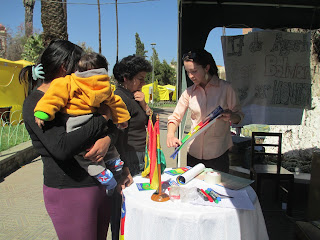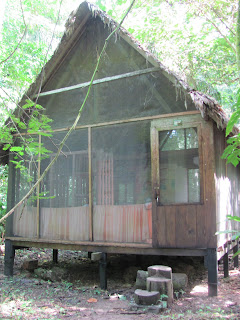There’s nothing like a surprise holiday to finally get down
to business and catch everyone up on what’s been going on since last December
(please forgive my absence)!
In the months of
December, January, February and right up till the deadline of March 15th,
I was very hyper-focused on finishing our parallel report for the Universal
Periodic Review (UPR) of Bolivia. It was a large group effort and as you know,
working in a team makes for a richer document as well as a more time-consuming
process, but in the end we did it! Together with dedicated people from Christian
Brothers, Missionary Sisters of the Holy Spirit, Divine Word, Oblates, Maryknoll
Sisters and Maryknoll Lay Missioners, and Franciscans (both religious and laity),
we finished our forums, consultations with individual groups of women and children/teens,
and were able to put together their voices along with our experiences and analysis
to form a well-rounded report from civil society on the situation of human
rights (for women and children) in Bolivia.
Turning in a report to the United Nations doesn’t
necessarily do much on its own – rather it serves as a platform for jumping-off
into a much larger campaign to better the situation, the reality on the ground.
That’s why in the months between March and now, we’ve been coming up with
strategies as to how to seek changes using the opportunity of Bolivia’s review (UPR)
to bring more attention to the areas that need improvement and hopefully
political will to change them.
In July we had a workshop in order to better understand how
to use the human rights mechanisms that the UN offers (there are many others
besides the UPR) to seek improvement. Overall it was a success and we were able
to have the national ombudsman with us for an entire day and the next day we
had two representatives from the office of High Commission on Human Rights of
the UN in Bolivia. To read more about
it, please see this article on the website http://franciscansinternational.org/News.111.0.html?&tx_ttnews[tt_news]=451&cHash=3bab79ad10a7adf3377ed3895377605e
Just two weeks ago, I went to La Paz and gave a workshop to
prepare for “lobbying” visits to 9 different embassies that took place in the
two days to come. We went to talk about the recommendations those countries
made to Bolivia back in the UPR of 2010 to offer our analysis of their
recommendations’ implementation as well as share the recommendations that came
out of the consultations we did with people on the ground. We visited the embassies
of Panama, Brazil, Mexico, Italy, Costa Rica, Germany, Switzerland, Spain and
Chile. Overall the conversations went very well and they were appreciative of
our visits and our report because they work in the embassies and depend mostly on
the news and their own personal experiences to get a feel for what is going on
in the country. They can’t be out in the communities with the people like we
are, so they were grateful to receive other perspectives.
The only “people” able to make recommendations to a country
when the time comes up for their Review are other member States of the UN. It
is a peer review, that’s part of what makes it a good tool—every country passes
through the examination chair. Since civil society cannot make official
recommendations, we try to inform member nations about our perspectives,
concerns and recommendations so that they can put them forward officially in
the UPR.
At the beginning of October, thanks to Franciscans
International, I will have the privilege of accompanying a Bolivian Sister to
Geneva in order to present at the Pre-Session of Bolivia’s UPR. It will take
place in a fairly small informal room not on the property of the UN itself, but
hopefully at least a good 40 countries will send someone to listen, essentially
do their homework before the date of Bolivia’s UPR, which is at the end of
October or beginning of November at the Human Rights Council. Aside from the
Pre-Session presentation, we will also have many other smaller meetings with
different permanent missions (If this is new lingo to you as it is for me,
permanent mission means a country’s representation at the UN. It’s like
embassy) to talk about the issues.
It seems that I have already written a lot for today, so in
the next blog, I will be talking more specifically about what we found in our
consultations and what recommendations we put forth in our report. Thank you so
much for reading!
5 Things I’m grateful for today: unexpected holidays (thank
you Bolivia); seeing pictures of my cousins’ sweet children; eating
strawberries; meeting new-born babies of two Bolivian friends in the past week;
the gift of health.


















